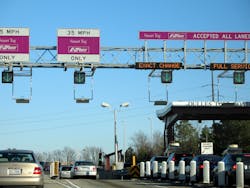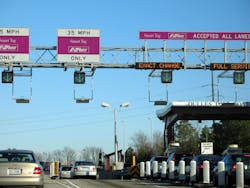Tolls, taxes and fees: Why we are stuck with underfunded highways
Last week saw a flurry of statements, proclamations and pie-in-the-sky dreaming from politicians announcing that they have the solutions to fix our deteriorating highways.
As each statement came out last week, there were two underlying issues that emerged: our roads need a major infusion of cash, and no one can agree on how to fix them.
The idea of raising gasoline and diesel fuel taxes is one approach – not supported by everyone. Taxing vehicle miles is another – again, not supported by everyone. Tolling Interstates is a third option, and guess what? Not everyone can agree on that.
And it is that disagreement that has bogged down the debate on how to fund the maintenance of our roads and bridges for years. The first federal gasoline tax was introduced in 1932 – pegged at 1 cent per gallon. The current federal tax, 18.4 cents per gallon, was set in 1993. And it hasn’t been raised since then.
Therein lies our real problem. It was never indexed to inflation, so as the price of goods increased in this country, the gas tax never went up. As the cost to maintain roads and bridges increased, the tax that pays for such work stayed the same. And as more vehicles – cars and trucks alike – have seen increasing fuel economy and efficiency, as mandated by government, fuel taxes stay the same. So each vehicle now pulls in a smaller amount of taxes relative to 1993.
I’m not an economist, but even I can see there is a problem. So solutions are being pitched.
Each approach has its pros and cons, but tolling seems to have the most detractors. To help lead the fight against increased tolling, a cross-section of businesses that would be affected, including the American Trucking Assns., FedEx and UPS, and even McDonald’s, have joined forces to create the Alliance for Toll-Free Interstates (ATFI). ATFI said it will be focused on educating the public and policymakers about the negative impact that tolling existing Interstates will have on citizens, businesses, and the U.S. economy.
According to the organization, businesses are concerned about the economic hit they could take if states start putting up tolls along Interstates.
(To hear ATFI explain the problem with tolling the nation's highways, click here)
“Since its inception, the Federal Interstate Highway System has facilitated unrestricted commerce and travel throughout the country. It is vital to the U.S. supply chain and has revolutionized the way America does business. Tolling existing Interstates would reverse this progress, raising costs for travelers, businesses, and consumers, and harming the many businesses and communities located along Interstate routes subject to new tolls,” said Jay Perron, ATFI member and vice president of government affairs and public policy for the International Franchise Assn.
According to the Federal Highway Administration, the Interstate system accounts for only about 1.1% of the nation’s total public road mileage, but carries 24% of its highway traffic. So, the potential revenue available from tolling is significant.
ATFI has the support of many carriers, which would be subject to additional fees that would have to ultimately get passed on to consumers through increased rates.
“The creation of the federal highway system opened an avenue of commerce never before seen in the U.S. This concept of unrestricted movement is a pillar of the modern economy. We support increased funding for highways but oppose tolls on current federal Interstate capacity. Tolls are an inefficient method of funding, would increase the cost of moving goods, and would decrease efficiency by pushing Interstate traffic onto less safe and slower local roads,” said Bill Cranfill, general counsel for Old Dominion Freight Line, a member of ATFI.
A few years ago, Congress created a pilot program that would allow up to three states to install tolls on existing Interstate lanes. Many states have applied, including Virginia and Rhode Island, both of whom wanted to toll I-95, but no state has actually received Federal Highway Administration approval, according to ATFI.
As a result, the organization is calling on Congress to repeal the program.
“We know that Congress must find funding to meet our transportation infrastructure challenges. However, time and again, tolls have proven to be an unreliable, expensive, and inefficient means of generating revenue for roads,” said Hayes Framme, spokesman for ATFI.
Whether tolling, raising fuel taxes, creating a new tax system, or some combination of the three, are the ultimate answer we settle on, the real fight is between the politicians.
Yet despite that, Obama indicated in his speech last week that some sort of deal could be worked out. “We are seeing some glimmers of hope,” he emphasized. “Roads and bridges should not be a partisan issue [as] more Americans should have access to affordable and efficient transportation. This is not the end. This is the beginning; we’ve got a lot more rail to lay and a lot more roads to travel.”
As much as the president talks about the possibility of a deal, I find it highly questionable, even unlikely, that there is a deal to be reached. If our elected leaders, back in 1993, had thought to peg fuel taxes to inflation, we may not be in such dire shape today. But they didn’t, and they didn’t for the same reasons our politicians of today can’t reach agreement on how to fix our failing infrastructure: raising taxes, in any form, is a tough sell to the masses.
It’s why the Highway Trust Fund needed an infusion of cash from the general fund to keep going a few years ago and why it will need another infusion in the near future if a new funding mechanism isn’t found.
And being an election year, with the highway reauthorization bill known as MAP-21 set to expire just before the election, it’s highly doubtful that our politicians will be able to strike a landmark deal to address future funding needs. More than likely, as has been done so many times before, there will be a short extension, perhaps 3 or 6 months, of the current bill, followed by another extension and eventually a new highway bill that never fully addresses the funding issue.
Kick the can down the road. It’s what we’ve done so well since 1993. Eventually, though, that can stops rolling.

